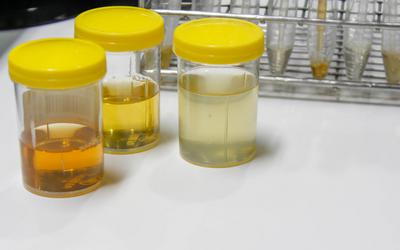How Florida Employers Can Save Money by Ensuring They Qualify for the Drug-Free Workplace Credit
In 1990, Florida adopted the Federal Drug-Free Workplace Program, incentivizing employers in the state to combat workplace drug use in an effort to improve worker safety.

In 1990, Florida adopted the Federal Drug-Free Workplace Program, incentivizing employers in the state to combat workplace drug use in an effort to improve worker safety.
The program calls for employers in the sunshine state to adopt a drug free workplace policy, which will reduce the risk of on-the-job drug and alcohol use and increase the productivity and safety of their workforce. Companies who adhere to the program and provide documentation of its efficacy qualify for a five percent credit on their workers' compensation premium — a hefty savings for mid-sized and enterprise organizations. [MA1]
However, with marijuana legalized for medical users – and recreational legalization [MA2] on the horizon – abiding by these guidelines could prove easier said than done. A recent national Health Street study revealed that 60 percent of people regularly use cannabis products at least a few times each month – and they are pretty consistent with their consumption. Even when they do abstain to pass a pre-employment drug screening, 73% of respondents return to their normal marijuana usage levels within one month.
If you want to continue receiving the credits, ensure you comply with all the program guidelines by following the key steps outlined below.
Create and Share Your Drug Testing Policy with Applicants and Employees
In order to comply with the Federal Drug-Free Workplace Program, you're required to create a detailed drug testing policy and share it with all applicants and employees. Inform the individuals seeking employment with your company of your commitment to maintaining a drug-free workplace. Though this may scare away some applicants, it will help ensure you are attracting talent whose viewpoints align with your company's goals.
To abide by all program guidelines, your policy should provide information about:
To save yourself from being discharged from the program and having your credits revoked, clearly share all drug testing requirements on your job vacancy postings.
Pre-Employment Drug Screening Procedures
Pre-employment drug screenings are vital in complying with the program's requirements.
These include:
Everything from the collection of the specimen to the preservation of non-negative results must follow federal guidelines. The strict procedural requirements ensure applicants that confidentiality and accuracy in testing is top-of-mind for companies seeking employees.
Don't miss out on the benefits of participating by going with a sub-par partner. Make sure that your tests and results are within the program guidelines by using one of our test panels to screen your prospective employees.
Why You Should Test Current Employees
You must test current employees for drugs in a few specific circumstances while operating within the guidelines of the Federal Drug-Free Workplace Program for Florida. One of those circumstances is in the event you reasonably suspect an employee is using drugs or alcohol on the job.
However, to go beyond the strict compliance regulations and truly ensure you workplace stays drug-free, employers should also consider implementing random drug testing.
Health Street surveyed 592 participants from locations around the country, 84 percent of whom are employed. Out of those, half were required to take a drug test that detects marijuana upon beginning employment at their current jobs.
Of those required to take a drug test, over half returned to drug use almost immediately, with 57% using marijuana within the week after their test. Another 16% of respondents used marijuana several weeks after that, with a total of 73% of respondents affirming to using marijuana within a month after their drug test.
What do these results prove? Pre-employment testing is more effective at deterring marijuana use while candidates are still at their former jobs, not when they make the transition to your workplace.
Dealing with Failed Drug Tests
In the event that an employee fails a drug test, you must complete a confirmation test before moving forward in removing that individual from the workplace. When faced with these well-defined circumstances, you must elect to drug test your employees – or you could lose your workers' compensation credit and other benefits.
If your workers join an employee assistance program, you can elect to require a drug test upon completion of their time there. You cannot, however, fire employees for reaching out for help and entering treatment on their own accord. From our recent survey, 73% of respondents said they continued drug use within a month of pre-employment screening. You also have the ability to conduct random drug testing at your discretion if that is needed to maintain a drug-free workplace.
What Types of Drug Testing Products Should You Use?
Despite the legalization of cannabis in 33 states, it remains illegal at the federal level. As a result, you have the ability to test for cannabis to remain in compliance with the federal drug-free program. You also have the right to test for any, and all, of the following substances:
The guidelines do not define which drugs you must include on the test, so you can customize your testing procedures to the needs of your company. You can freely select from all the employment drug test products, including the 10-Panel urine drug test with or without THC detection, to best support your drug-free workplace policies.
Providing Employee Assistance Programs
The Federal Drug-Free Workplace Program only requires that you supply applicants and current employees with contact information for local employee assistance programs. You can go one step further in supporting your employees by setting up an internal or external program of your own. These programs provide immense support to those who are looking to recover from drug and alcohol addiction.
Your employees can voluntarily enter the program or you can arrange their admittance as a condition of employment after a failed drug test. Either way, their participation provides access to professional assessments, short-term counseling, and referrals. Your company benefits as well, as your employees receive the help they need to remain safe and productive on the job.
If you're a Florida employer looking for assistance in navigating your state's Drug-Free Workplace Credit Requirements, give Health Street a call. Our drug screening specialists can help guide you through the process, implement a compliant employee screening program, and make sure you qualify for the ensuing credit.
Get in touch at (888) 378-2499 to learn about your options.





